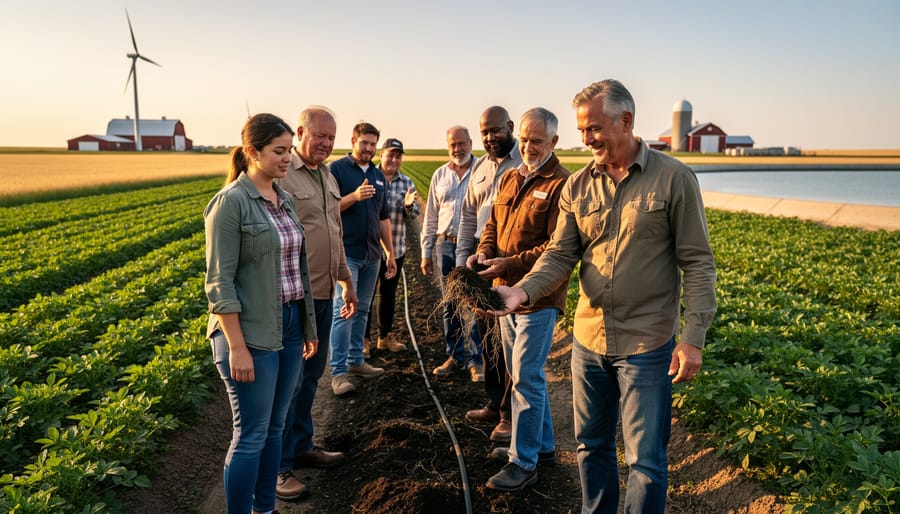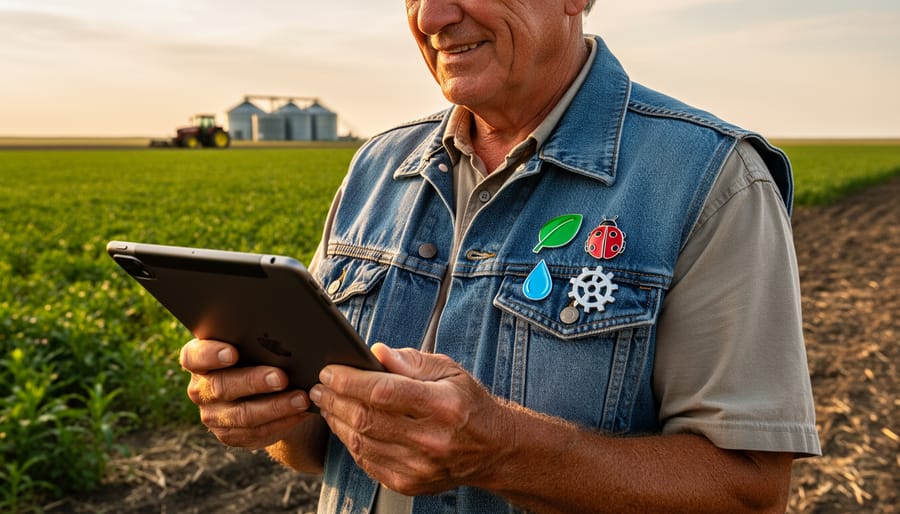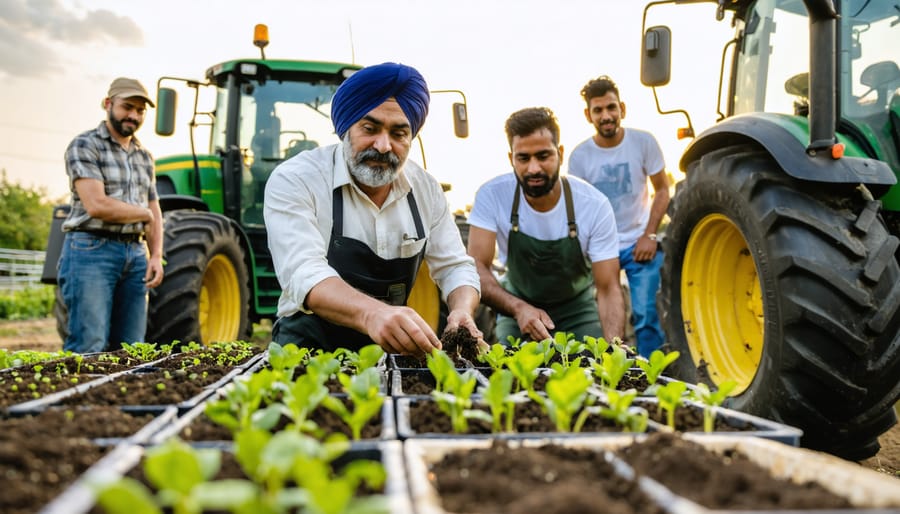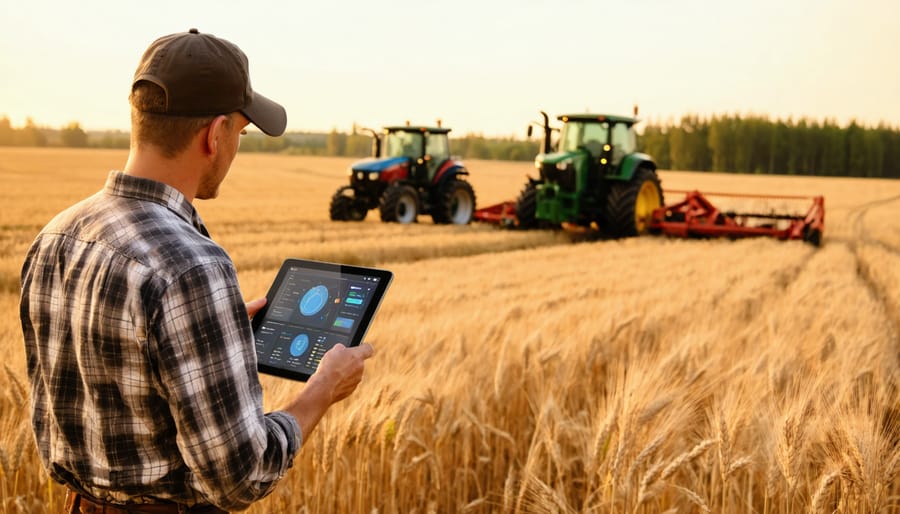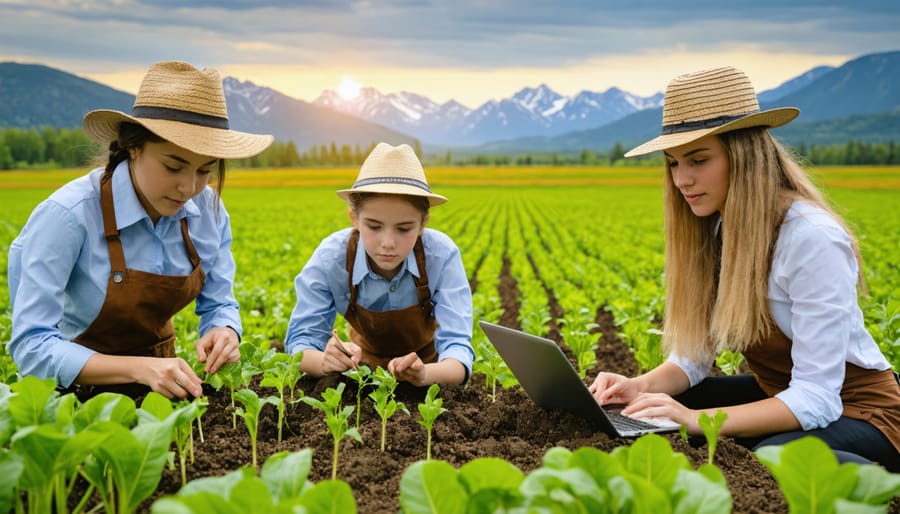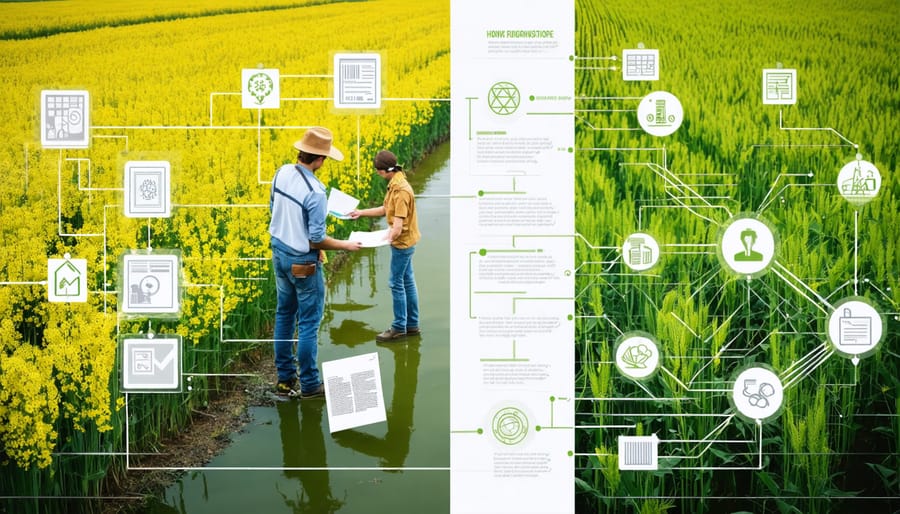Join forces with neighboring farms to create climate-strong communities through shared resources, knowledge, and collective action. Across Alberta’s agricultural landscape, community-based climate initiatives are transforming how we approach environmental challenges, delivering practical solutions that work for local farmers while strengthening regional resilience.
Our farming communities hold unique power to combat climate change through collaborative action. By pooling resources, sharing successful adaptation strategies, and implementing joint conservation projects, Alberta farmers are pioneering a model of grassroots climate response that’s both economically viable and environmentally effective.
From collective water management systems to shared renewable energy projects, these community-driven initiatives demonstrate how local agricultural knowledge, combined with modern sustainable practices, creates lasting positive change. This collaborative approach not only reduces individual farm operating costs but also builds stronger, more resilient rural communities prepared to face climate challenges together.
Through coordinated effort and shared purpose, Alberta’s farming communities are proving that the most effective climate solutions grow from the ground up, rooted in practical experience and strengthened by collective wisdom.
Building Strong Climate Action Networks in Rural Alberta
From Farm to Forum: Creating Local Climate Teams
Building a local climate team starts with identifying passionate community members who share concerns about agricultural sustainability. Begin by reaching out to neighboring farms, local agricultural associations, and environmental groups to gauge interest. A core team of 5-7 members often works best for initial coordination.
Once you’ve assembled your team, establish regular meeting schedules and clear objectives. Many successful Alberta teams start with monthly gatherings at local community centers or rotating farm locations. Focus on organizing effective farm workshops where members can share experiences and learn from each other.
Create a communication plan using accessible tools like WhatsApp groups or email newsletters to keep everyone informed. Consider partnering with local agricultural extension offices and climate experts who can provide valuable insights and resources. Document your progress through photos and success stories to inspire other communities.
Remember to start small and build gradually. Many successful climate teams began with simple initiatives like soil health monitoring or water conservation projects before tackling larger challenges.

Connecting Experts with Local Knowledge
In our workshops, we create a dynamic environment where agricultural scientists and local farmers share their unique perspectives on climate-smart farming. These collaborative sessions typically pair climate experts from institutions like the University of Alberta with experienced farmers who have generations of practical knowledge about the local landscape.
During these gatherings, farmers share their firsthand observations of changing weather patterns and soil conditions, while researchers provide scientific context and data-driven insights. For example, a third-generation farmer from Leduc County recently shared his successful cover cropping techniques, which researchers then connected to broader soil health and carbon sequestration principles.
The workshops often feature hands-on demonstrations, where participants can examine soil samples, compare crop varieties, and discuss adaptive farming techniques. This practical approach helps translate scientific concepts into actionable strategies that work for Alberta’s unique growing conditions.
To enhance learning, we organize field visits to demonstration farms where successful climate-smart practices are already in place. These visits allow farmers to see real-world applications and discuss implementation challenges with peers who have already adopted these methods. The resulting knowledge exchange has helped many local farmers develop more resilient farming practices while contributing to climate solution databases.
Real Results from Alberta’s Climate Workshops
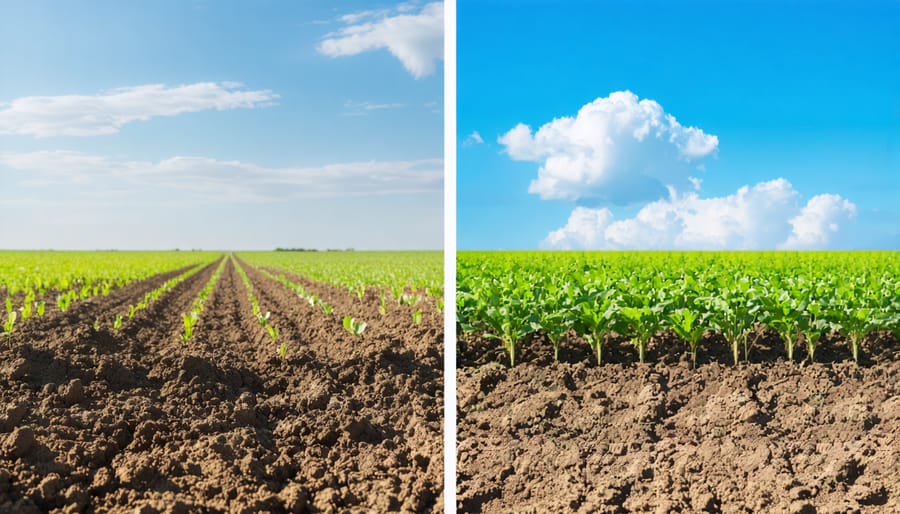
Carbon Reduction Success Stories
Alberta’s farming communities have demonstrated remarkable success in collaborative climate action, with several notable achievements worth celebrating. The Morrison Family Farm in Red Deer County partnered with 15 neighboring farms to implement regenerative agriculture practices, resulting in significant soil health improvements and a 30% reduction in carbon emissions over three years.
The Lethbridge Agricultural Carbon Coalition, comprising 50 local farmers, successfully reduced their collective carbon footprint by 25% through shared equipment purchases and coordinated crop rotation strategies. Their initiative helped sequester an estimated 2,000 tonnes of carbon annually while improving crop yields by 15%.
In the Peace River region, the Northern Stewards Initiative brought together 30 farming families to implement precision agriculture techniques. Using shared data and resources, they reduced fuel consumption by 40% and decreased synthetic fertilizer use by 35% across 12,000 hectares of farmland.
The Lakeland Climate Action Group, representing 25 mixed farming operations near Cold Lake, achieved remarkable results through their methane reduction program. By adopting innovative feeding strategies and manure management practices, participating farms cut their methane emissions by 20% while maintaining production levels.
These success stories demonstrate how community-based approaches to climate action deliver tangible results. The participating farms not only reduced their environmental impact but also experienced improved operational efficiency and cost savings, proving that collaborative climate action can benefit both the environment and farm businesses.
Economic Benefits for Participating Farms
Participating in climate-smart agricultural practices through community collaboratives offers substantial financial benefits for Alberta farms. Our research shows that farms implementing sustainable practices typically see a 15-30% reduction in operational costs within the first two years.
Through collective purchasing power, farms can access discounted rates on equipment, seeds, and sustainable technologies. Many participants report saving an average of $12,000 annually on bulk purchases alone. The collaborative approach also enables farms to share specialized equipment, reducing individual capital investments by up to 40%.
Soil health improvements from climate-smart practices lead to decreased input costs. Farmers using cover crops and reduced tillage report spending 25% less on fertilizers while maintaining or improving yields. Water conservation measures can cut irrigation costs by up to 35% annually.
The transition to renewable energy cost savings through collaborative installations has helped many farms reduce their energy bills by 40-60%. Carbon credit programs available through the collaborative provide additional revenue streams, with participating farms earning an average of $8,000-15,000 annually.
Government grants and incentives accessed through the collaborative have helped offset implementation costs. In 2022, participating farms received an average of $25,000 in funding support for climate-smart improvements. Insurance companies are also beginning to offer premium reductions for farms implementing risk-reducing climate practices, resulting in average savings of $3,000 annually.
The collaborative’s shared marketing initiatives have helped farms command premium prices for sustainably produced crops, with participants reporting 10-20% higher returns compared to conventional markets.
Workshop Blueprint: Creating Your Local Climate Action Team
Essential Workshop Components
Successful climate action workshops require careful planning and essential components that foster engagement and meaningful outcomes. Based on experiences from Alberta’s farming communities, we’ve identified key elements that make these collaborative sessions truly effective.
First, ensure diverse representation from your local agricultural community. Include a mix of experienced farmers, agricultural specialists, and newcomers to create rich discussions and knowledge sharing. Having 15-20 participants typically allows for intimate group work while maintaining dynamic conversations.
A skilled facilitator familiar with both farming practices and climate initiatives is crucial. They should be able to guide discussions while allowing organic conversation flow and ensuring all voices are heard. Consider partnering with local agricultural extension offices or experienced farm mentors who understand regional challenges.
Physical space matters significantly. Choose a venue that’s accessible to local farmers, preferably a community hall or farm meeting space. Arrange seating in circles or small groups to encourage interaction and dialogue rather than classroom-style arrangements.
Essential materials include visual aids showing local climate data, practical examples of successful adaptation strategies, and worksheets for action planning. Include refreshments and scheduled breaks to maintain energy levels and allow for informal networking.
Time management is critical – structure workshops into 2-3 hour sessions with clear objectives. Include hands-on activities, such as farm scenario planning or soil health demonstrations, to keep participants engaged and learning actively.
Most importantly, end each session with concrete action items and follow-up plans. This ensures the workshop translates into real-world implementation on participating farms.
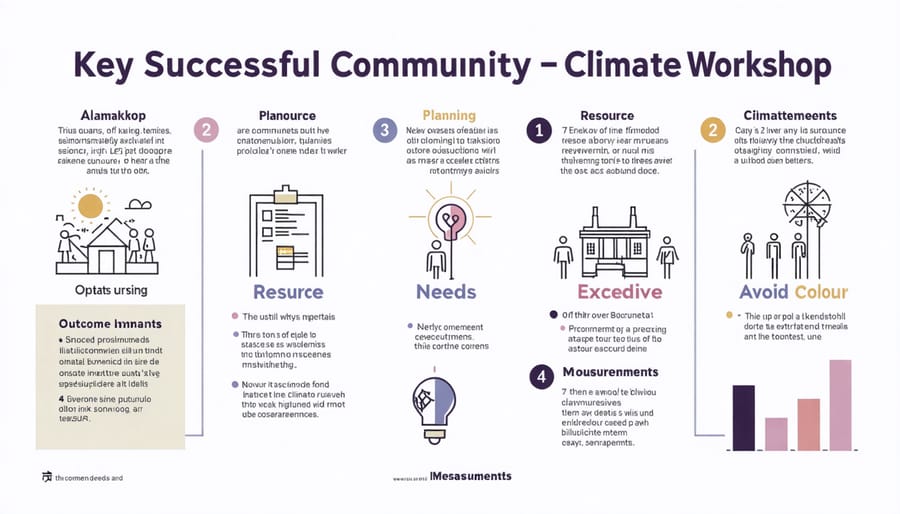
Engaging Your Farming Community
Building a successful climate collaborative starts with genuine connections in your farming community. Begin by reaching out to neighbouring farms, local agricultural associations, and community leaders who share your environmental concerns. Consider hosting regular coffee meetings or farm tours where fellow producers can discuss climate challenges and share solutions in a comfortable, familiar setting.
To maintain momentum, establish clear, achievable goals that reflect your community’s needs. For example, the Southern Alberta Conservation Alliance saw strong participation when they focused on practical objectives like improving soil health and water efficiency. Their monthly gatherings combine learning opportunities with social elements, keeping members engaged and connected.
Create opportunities for visible wins early in your initiative. This might include organizing equipment-sharing programs for climate-smart machinery or coordinating bulk purchases of cover crop seeds. The key is to demonstrate tangible benefits that encourage ongoing participation.
Digital platforms can complement in-person meetings. Consider starting a WhatsApp group or private Facebook page where members can share quick updates, ask questions, and celebrate successes. Remember to recognize and celebrate individual contributions, whether it’s a farmer implementing new regenerative practices or a member organizing a successful workshop.
Keep communication regular but not overwhelming. A monthly newsletter highlighting local climate action success stories, upcoming events, and seasonal tips can help maintain engagement without creating information overload.
Measuring and Sharing Success
Tracking and sharing success is vital for maintaining momentum in community climate initiatives. In Alberta’s farming communities, we’ve found that combining quantitative metrics with storytelling creates the most impactful way to measure progress.
Start by establishing clear baseline measurements – including soil carbon levels, water usage, and greenhouse gas emissions. Many Alberta farmers are using digital tools and apps to track these metrics, making data collection more manageable. The Environmental Farm Plan program offers excellent resources for setting up measurement systems tailored to your operation.
Regular monitoring and reporting help maintain accountability and demonstrate real progress. Consider tracking:
– Reduction in fuel consumption
– Improvements in soil organic matter
– Number of participating farms
– Hectares under sustainable management
– Cost savings from implemented practices
Share your success through multiple channels: local farming newsletters, community meetings, and social media. The Alberta Agriculture and Forestry website provides templates for creating progress reports that resonate with both farmers and the broader community.
Remember to celebrate small wins along the way. Whether it’s a 5% reduction in water usage or ten new farms joining the initiative, these achievements help maintain enthusiasm and demonstrate the collective impact of your efforts. Personal stories from participating farmers often prove most effective in inspiring others to join the movement.
Resources and Support Networks
Provincial Climate Action Programs
Alberta’s agricultural sector benefits from several provincial initiatives designed to support climate-smart farming practices. The Environmental Farm Plan (EFP) program offers farmers guidance and potential funding for implementing sustainable practices, while the Canadian Agricultural Partnership (CAP) provides cost-sharing opportunities for environmental improvements on farms.
The Alberta Climate Information Service (ACIS) delivers valuable weather and climate data to help farmers make informed decisions about their operations. Through the Farm Energy and Agri-Processing Program, producers can access grants covering up to 50% of costs for energy-efficient equipment and renewable energy systems.
The Results Driven Agriculture Research (RDAR) organization supports innovative climate solutions through targeted funding for agricultural research and technology adoption. Local Agricultural Service Boards also provide technical assistance and sometimes offer additional funding for environmental projects.
These programs demonstrate Alberta’s commitment to supporting farmers in their transition to climate-resilient practices. Producers are encouraged to connect with their local agricultural fieldman or provincial program coordinator to learn more about available funding and support opportunities in their region.
Expert Networks and Technical Support
Our network connects you with experienced agricultural specialists, climate scientists, and successful local farmers who understand Alberta’s unique growing conditions. Through partnerships with Agriculture and Agri-Food Canada, provincial extension services, and leading research institutions, members gain access to personalized consultation services and technical support.
Regular webinars and online forums allow you to engage directly with experts in soil health, water management, and climate-resilient farming practices. Our help desk provides timely responses to specific questions, while our mentorship program pairs newer farmers with experienced producers who have successfully implemented climate-smart techniques.
Technical resources include detailed climate projection maps for Alberta regions, soil testing services, and customized farm assessment tools. Members can also access our database of region-specific case studies and success stories, demonstrating how other farmers have adapted to changing conditions while maintaining productive operations.
For more complex challenges, we facilitate connections with specialized consultants offering expertise in areas such as carbon credit programs, renewable energy integration, and sustainable irrigation systems. All support services are designed to be practical, accessible, and relevant to Alberta’s agricultural landscape.
The strength of Alberta’s farming community lies in our ability to come together and create meaningful change. By pooling our resources, knowledge, and determination, we’ve shown that community-led climate initiatives can yield remarkable results. From sharing sustainable farming practices to implementing collective water management strategies, our collaborative efforts are making a real difference in building climate resilience.
As we’ve seen through successful projects across the province, when farmers work together, we create solutions that benefit both our agricultural operations and the environment. These partnerships not only help us adapt to changing climate conditions but also strengthen our rural communities and preserve our farming heritage for future generations.
Remember, every step taken together, whether big or small, contributes to our collective impact. By continuing to support one another and share our experiences, we’re building a more sustainable and resilient agricultural future for Alberta.



